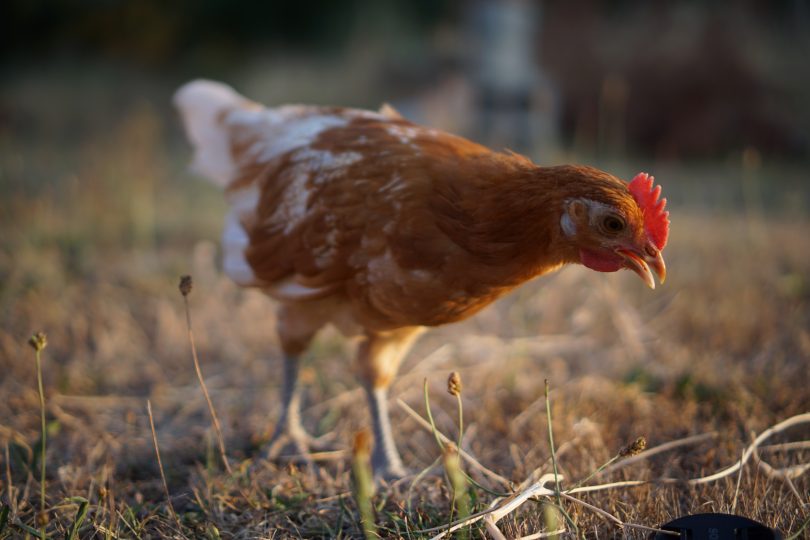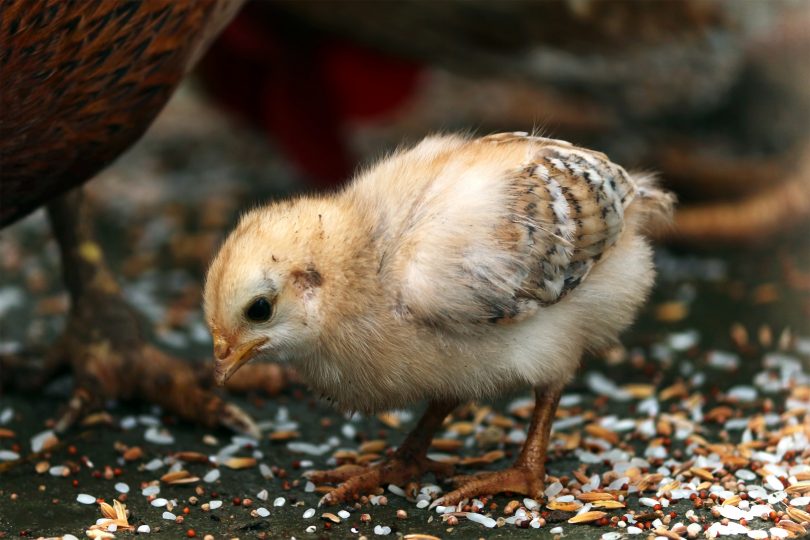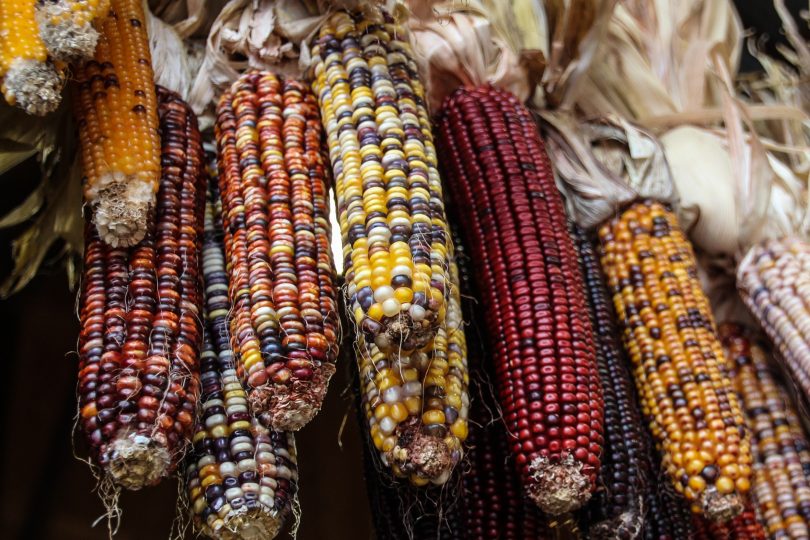
Photo: Max Welt, Unsplash
Chickens are omnivores like pigs, so they like a diet that includes protein from various sources. Chooks are not herbivores like cows, sheep or goats and so your flock can, and should, eat plant as well as animal proteins.
Chickens are naturally fantastic foragers. They love scratching around for bugs, grit and greenery. While free-ranging is great for your flock it is more about chicken welfare and won’t necessarily mean they are getting a good diet.
They need a good balance of carbohydrates, proteins, oils, minerals, vitamins and of course a constant supply of fresh cool water.

Photo: Prince Abid, Unsplash
Young chicks need a feed that is high in protein (22-24%) to support their rapid growth period. A chick starter will often be medicated to prevent coccidiosis. Some chick starters contain regano a natural coccidiostat based on oregano. After eight weeks use a grower mix (18-20% protein) then at four months they can be fed adult feed.
Be careful not to feed chicks the adult calcium rich feeds needed in egg-laying because it can damage their kidneys.
Laying hen feed should be around 18% protein and high in calcium to replace the calcium used to produce eggshells. The older they get the more calcium they need while they are laying.
Allow your flock to choose their extra calcium intake by providing on-demand dried eggshells that are whizzed in a blender. At home we offer a constant supply of whizzed shell in a small can with holes in the base to allow rain to pass through (rain remember that?!).
Most commercial stock feeds including pelletised chicken feed are made from genetically modified (GM) imported soybeans sprayed with glysophate (Roundup) for weed control.
Dairy processors have limits on GM stock feed for this reason, so we should be thinking about what’s going through our chooks in the food they eat which is then going into us.
Pellets are a highly processed food – the ingredients are heated to about 90degC so you lose nutrient density. Chooks also need a lot more water if they eat pelletised food.

Photo: Bart Heird, Unsplash
Scratch mix or simple grains may not provide enough protein (check the ingredients and analysis on the bag). You may need to boost protein from other sources.
We feed in the morning with high quality food and scraps, and try to provide green pick through the day and then cracked corn before bed in winter or other grains in summer if they are looking for it.
Here are a few things your can do to improve the quality of your flock’s diet:
- Grow some green manure we add a few brassica and alfalfa seeds. Winter and Summer mixes available from your local rural feed suppliers
- Fermenting grains – see our Chook Chat Vlog.
- Sprouting wheat or barley seeds
- Warm oats mash or cooked barley as a warming fattening treat
- Chickens can eat cooked eggs. They’re high in protein – see our Protein Platter Chook Chat Vlog
- Wynlen House Farm in Braidwood offer a fabulous high protein mash, Monkittee Mash, and they provide an online course on how to make your own highly nutritious feed from ingredients you can pick up at your local stock feed store.
- Chooks love green pick. Offer it in a hanging basket or trapped under a bandage wrapped around two big sticks.
- Azolla is a native pond, creek and dam plant with some seriously exciting attributes for anyone looking to develop closed-loop cycles for organic animal feed. It’s very high in protein and minerals, fixes nitrogen, is palatable to chickens, pigs, goats, ducks and cows, and can be grown on any closed body of water. You can make a little azolla farm in your backyard by growing it on a shallow dish of shaded water.
Things not to feed your chooks:
- Nothing mouldy, uncooked beans, chocolate, rhubarb leaves.
- Limit lettuce as it can cause diarrhea. Limit silverbeet or anything high in oxalic acid which can interfere with calcium absorption. Better to feed kale, cabbage and collards.
- Some bread, best if grainy
- Some rice, best if brown
- Some dairy/yogurt, not too much
- Avoid feeding your girls on the ground. Use a bowl.
- Don’t overfeed. They get a fatty liver and won’t lay.
Finally, grit is needed in their gizzard to break down feed because chooks don’t have teeth! They can often pick up enough of this as they forage but otherwise, you can buy a commercial grit.
If you put a little effort into your chicken’s diet, they’ll reward you by being healthy, and giving you lots of fresh healthy eggs.
Cheryl Nelson is the brains and heart behind Natural Chicken Health.
Subscribe HERE to the Natural Chicken Health Monthly Newsletter Vlog and follow Natural Chicken Health on Facebook.







